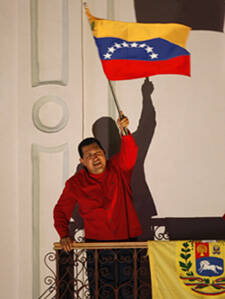In a supremely ironic exercise of their franchise, Venezuelan voters moved one step closer to dictatorship on Feb. 15 by removing term limits for President Hugo Chávez. The result permits Chávez to run for re-election indefinitely and possibly remain in power, as he has suggested, until 2049, when he will be 95 years old. The election was only marginally free, accompanied as it was by the usual trappings of authoritarian rule: violent crackdowns on student protests; a strictly enforced, nearly complete media monopoly for the government; even a seven-hour presidential speech in the oratorical tradition of Fidel Castro. “Chávez’s intention is clear: He aspires to be president for life,” said Michael Shifter of the Inter-American Dialogue in Washington, D.C. “But his capacity to pull this off is far from assured.”
That is an understatement. The plummeting price of oil, which generates an astounding 80 percent of the country’s total export revenue and helped fuel double-digit economic growth earlier in the decade, seriously threatens Chávez’s socialist revolution. Price controls designed to contain hyperinflation have led to food shortages. There is talk that the nation’s banking system faces imminent collapse and that Mr. Chávez may have to devalue the currency. Also, a closer look at the Feb. 15th election results shows that all is not well in this nascent and unlikely workers’ paradise. Even though he had every advantage, the margin of victory (54 percent to 45 percent) for Mr. Chávez’s referendum was only about one million votes, revealing that almost half the voters are displeased with Chávez’s reign.
The Obama administration’s response has been muddled. The State Department at first declared that Venezuela’s election “was held consistent with democratic principles”; then, following an onslaught of criticism, the department backtracked, saying, “The state of health of democracy in Venezuela is not very good” and that there is currently “no change in policy” from that of the Bush administration. It would be a major mistake indeed if there is to be “no change” in U.S. policy. For at least 50 years, U.S. policy toward Latin America in general, and toward Venezuela in particular, has been clumsy, paternalistic and myopic. What is required now is a new policy that is balanced and realistic.
The first component of such a policy should be the clear renunciation of gunboat diplomacy. President Obama should order the Central Intelligence Agency to shred any plans it may have for anything akin to the attempted coup it indirectly assisted in 2002. Such tactics are usually immoral and almost always impractical, producing little more than popular resentment. The second component of a new policy should be a multi-dimensional analysis of the political and economic situation in the region. While it is undoubtedly true that Mr. Chávez has undermined democracy in his country, it is also true that his policies have cut Venezuela’s poverty rate in half, helping to release the country’s working poor from the grip of an oligarchy that was indifferent to their plight. Mr. Obama’s only public comment about Venezuela thus far was made during an interview with Univision, in which he said that Chávez had “been a force that has interrupted progress in the region.” Perhaps, but Mr. Obama should try telling that to a Venezuelan mother who now has a roof over her head and schoolbooks for her children. Any new policy should recognize the legitimate aspirations of the Venezuelan people for economic justice as well as the legitimate successes of the Chávez regime.
The United States should also not repeat with Venezuela the mistakes it has made with other Latin American countries, particularly Cuba. Every strongman needs a bogeyman, a scapegoat, and for over 40 years successive U.S. administrations have played this role for Fidel Castro, giving his regime a much-needed raison d’etre in the process. Mr. Chávez aspires to be Fidel Castro’s successor in Latin America, a job that requires a certain degree of hyperbolic anti-Americanism. The United States should not take the bait. Mr. Chávez’s rhetoric will become less persuasive if the U.S. approach becomes more conciliatory.
The final component of a new U.S. policy simply involves Mr. Obama’s keeping his campaign pledge to engage in vigorous and open diplomacy with Mr. Chávez. On a host of policy issues—trade, immigration, economic development, drug policy, even a resolution to the conflict in Colombia—there is common ground and at least the possibility of progress. The administration should pursue initiatives in each of these areas, while leading the way to democracy through its example. In the end, respectful, intelligent dialogue, free trade and the arc of history will do more to counter Mr. Chávez’s anti-democratic antics than anything else.








